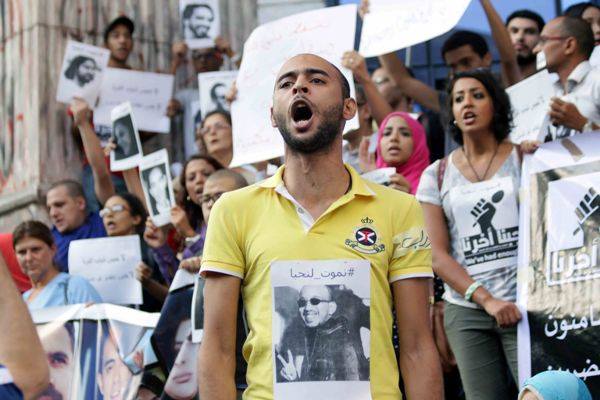Latest NEWS
- Aswat Masriya, the last word
- Roundup of Egypt's press headlines on March 15, 2017
- Roundup of Egypt's press headlines on March 14, 2017
- Former Egyptian President Hosni Mubarak to be released: lawyer
- Roundup of Egypt's press headlines on March 13, 2017
- Egypt's capital set to grow by half a million in 2017
- Egypt's wheat reserves to double with start of harvest -supply min
- Roundup of Egypt's press headlines on March 12, 2017
Editors and journalist referred to criminal court for "false news" and illegally practicing journalism

CAIRO, May 25 (Aswat Masriya) - Egypt's top prosecutor referred on Monday the chairman of a newspaper to criminal court for "publishing false news" and illegally practicing journalism, alongside the newspaper's chief editor and one of its journalists.
Prosecutor General Hisham Barakat said in a statement published by his office on Monday that al-Bayan newspaper published a "false" news story on its website last week saying that six prosecutors were assassinated on the Cairo-Suez Road.
The three defendants are accused of "publishing false news which would disturb public security, spread terror among citizens and harm the public interest," the statement read.
The prosecutor general said that the said news story was among the most read on the news website the day it was published. It added that the readers' comments on the story expressed their "fear".
The prosecution also charged the newspaper chairman and chief editor with hiring people who are not enrolled at the Press Syndicate, whereas the journalist was charged with practicing journalism without being a syndicate member.
According to Egyptian laws, anyone who is not a member of the Press Syndicate cannot practice journalism or assume the title of newspaper chairman. Anyone who violates this law would be accused of impersonating a journalist.
"The prosecutor general urges the Press Syndicate to perform its legal role and take the necessary measures to limit the practice of journalism by those not enrolled in the syndicate," the statement read.
Egypt's Press Syndicate had strongly criticised the prosecution's decision to issue an arrest warrant against the newspaper's chief editor last Monday.
The syndicate said in a statement that the arrest warrant violates two articles of the law organising journalism. It also noted that Egypt's laws ban preventive detention in cases related to publishing.
The Egyptian constitution states that the freedom of the press is guaranteed. It also states in Article 71 that no freedom-restricting penalty may be imposed for "crimes of publishing." However, it does leave it up to the law to decide on the penalty undertaken for incitement and discrimination.
Press freedom in Egypt has lately come under scrutiny. The state faced grave criticism after a Cairo court sent three journalists from the Qatari al-Jazeera network to seven to ten years in prison last June for defaming Egypt and spreading false news.
Two of journalists are currently being retried from outside court, while the third, an Australian national, was deported in early February.
The New York-based Committee to Protect Journalists (CPJ) sent President Abdel Fattah al-Sisi a critical letter of Egypt's media climate in March.
It said in the letter it would like to discuss with Egypt's presidency "the use of pre-trial detention, anti-terrorism laws, and the protest law against journalists."
The international press freedom advocate said it would also like to discuss the "increasing efforts to censor and surveil the Internet."










